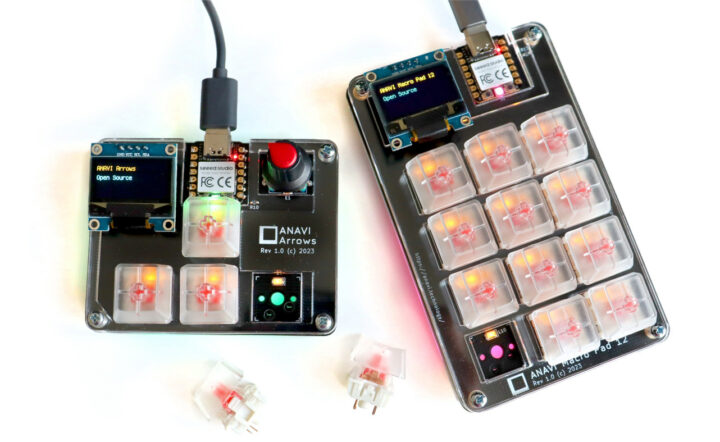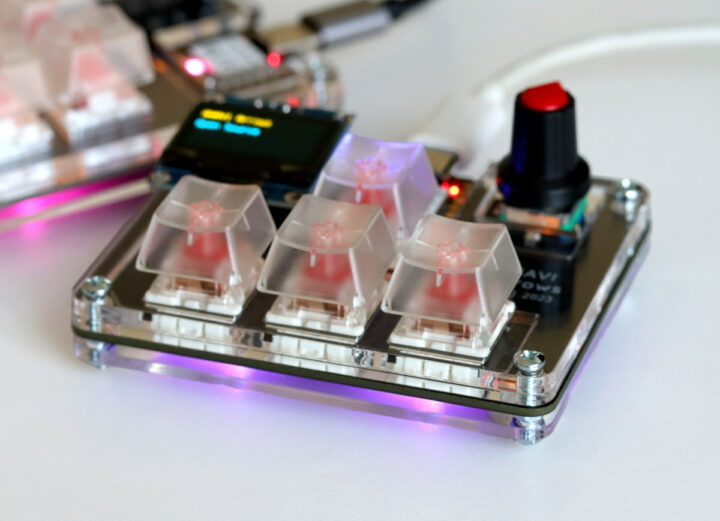ANAVI Technology has launched two more open-source hardware mechanical keyboards based on the Raspberry Pi RP2040 microcontroller, equipped with an OLED display, and programmable with CircuitPython: the ANAVI Macro Pad 12 with 12 keys and the ANAVI Arrows with four keys and a rotatory encoder.
The new mechanical keyboards follow ANAVI Macro Pad 10 & Knobs input devices equipped with the same Seeed Studio XIAO RP2040 MCU module running the KMK firmware written with CircuitPython, but with different form factors and features.
ANAVI Macro Pad 12 specifications:
- MCU module – Seeed Studio XIAO RP2040 with Raspberry Pi RP2040 dual-core Cortex-M0+ microcontroller @ up to 133 Mhz with 264KB SRAM, 2MB SPI flash, USB Type-C port
- Keys – 12x Gateron red, linear, non-clicky mechanical switches and transparent keycaps with yellow LED backlighting
- Display – OLED display connected to I2C slot (can be replaced with another I2C module)
- Host interface – USB Type-C port from the XIAO RP2040 module
- Misc – RGB LED for each key on top, 6x WS2812B addressable LEDs for bottom-lighting
- Dimensions – 116.7 x 73.0 mm
ANAVI Arrows specifications:
- MCU module – Seeed Studio XIAO RP2040 with Raspberry Pi RP2040 dual-core Cortex-M0+ microcontroller @ up to 133 Mhz with 264KB SRAM, 2MB SPI flash, USB Type-C port
- Keys – 4x Gateron red, linear, non-clicky mechanical switches and transparent keycaps with yellow LED backlighting
- Input – 1x rotary encoder with clickable switch
- Display – OLED display connected to I2C slot (can be replaced with another I2C module)
- Host interface – USB Type-C port from the XIAO RP2040 module
- Misc – RGB LED for each key on top, 4x WS2812B addressable LEDs for bottom-lighting
- Dimensions – 80.0 x 63.2 mm
You’ll find the CircuitPython source code for both mechanical keyboards on Github, and the ANAVI RP2040 mechanical keyboards can also be found in the official KMK repository. The firmware relies on the standard USB HID class, and the keyboards work in Windows, macOS, and Linux. Both keyboards are open-source hardware designs, and Leon ANAVI also released the KiCAD hardware design files for both the 12-key board and the Arrows board.
ANAVI Technology now has a range of seven mechanical keyboards based on the Raspberry Pi RP2040 or Microchip ATmega32U4/ATTiny85 microcontroller, so a table has been provided comparing the different features of each model so that you can select the one that better meets your needs.
As usual, the new ANAVI mechanical keyboards have been launched on Crowd Supply. The ANAVI Macro Pad 12 kit requires a $57 pledge, while the smaller ANAVI Arrows goes for $42. Shipping is free to the US but adds $12 to the rest of the world. Deliveries are scheduled to start by mid-October 2023.

Jean-Luc started CNX Software in 2010 as a part-time endeavor, before quitting his job as a software engineering manager, and starting to write daily news, and reviews full time later in 2011.
Support CNX Software! Donate via cryptocurrencies, become a Patron on Patreon, or purchase goods on Amazon or Aliexpress







